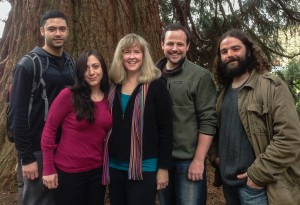 Phronesis Lab Founders L-R:
Phronesis Lab Founders L-R:
Sione Filimoehala, MA; Stephanie Jenkins, PhD; Sharyn Clough, PhD; Sean Creighton, MA; Matt Gaddis, MA.
Phronesis Lab came out of a 2012 summer reading group of OSU philosophers— faculty, grad and undergrad students—focused on pragmatism. Pragmatism is a movement associated with American philosophers such as John Dewey, and more recently Richard Rorty, and also represented in the thought of European scholars such as Michel Foucault. Pragmatists are committed to the view that we come to understand philosophical ideas such as truth, democracy, peace, and justice, only as these ideas are embodied in our day-to-day practice. Ideas stripped from practice become incomprehensible, ineffective, static lumps that get in the way of the goals those ideas were meant to serve. We pragmatists try to mix things up. We test our ideas in the world.
We began by planning a laboratory for ideas. We developed a number of hypotheses, we formed alliances across our community, and we applied for funds to test our hypotheses. Our Phronesis Lab projects thus far have involved interventions within a number of settings, putting democracy, peace, and social justice into practice in our classrooms, in the scholarship and research we work on, and in our community engagement.
A few examples (these have not been updated in awhile – our home page has more details :-):
- We designed and offered for four years an on-campus philosophy seminar on Peace and Social Justice for high school credit, to high school students from the Alternative Education Program at College Hill High School. This class was first run by Phronesis Lab founders Sean Creighton, Matt Gaddis, and Sione Filimoehala, with help from Peace Corps alum, Johns Hopkins graduate student, and now elementary school counsellor, Ashley Eveleth, as well as OSU History of Science PhD student, now faculty, Linda Richards.
- We have re-oriented our scholarly publications to practical, engaged themes, especially concerning the peace skills needed to navigate controversial science policies (e.g., Sharyn Clough’s 2020 essay “Charity, Peace, and the Social Epistemology of Science Controversies”).
- We offer workshops and online trainings in Peace Literacy (visit peaceliteracy.org/workshops for more info)

